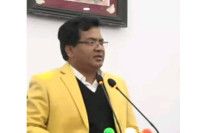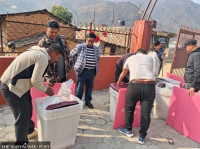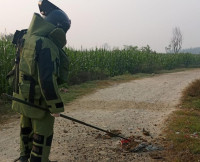National
Stigma against health workers, patients and area locals continues in Covid-19 hotspots
In districts like Udayapur that have reported a high number of Covid-19 cases, health workers and locals are being shunned and treated as pariahs..jpg&w=900&height=601)
Arjun Poudel
On Sunday, a team of health workers from the Health Ministry and Epidemiology and Disease Control Division were deployed to Udayapur for contact tracing of all those who had been infected with the coronavirus. Udayapur has emerged as the epicentre of the Covid-19 outbreak in Nepal, with 28 of a total 57 cases of the coronavirus in Nepal.
But while in Udayapur, the health workers were routinely turned away from hotels and restaurants, denied food and lodging, according to team members.
“We were not only denied rooms and food in the disease-hit districts but also on the way there and back to Kathmandu,” a Health Ministry official who was part of the team told the Post. “When they found out that we were returning from districts with many cases of Covid-19, like Udayapur, Parsa and Jhapa, they even refused to talk to us. If we were treated like this, you can only imagine how much discrimination the locals might be encountering.”
The health workers ultimately managed to find accommodations at the staff quarters of various government institutions but what they reported is that the situation at the local level is much more alarming.
Health workers serving in local hospitals and laboratories are also facing difficulties finding food and shelter, said officials.
“Yes, several health workers were expelled from their room and denied food in hotels,” said Mahendra Prasad Shrestha, director general of the Department of Health Services. “Some level of precaution is good for safety reasons but there cannot be stigma and discrimination.”
According to Shrestha, several health workers from the Hetauda laboratory have complained to the Health Ministry that they were discriminated against and refused service by restaurants.
Life has come to a halt in various districts, with entire neighbourhoods sealed off and all markets closed. Covid-19 hotspots like parts of Udayapur have been sealed by the local administrations and all public movement has been prohibited. Even locals have erected makeshift barriers to prevent entry and exit from their neighbourhoods. Anyone who is from the areas with a large number of Covid-19 cases is treated as a pariah, said officials.
“People have even stopped purchasing goods from people from disease-hit areas. If you say that you are from Udayapur, Jhapa, Parsa or Kailali, people will hesitate to talk to you,” another official from the Epidemiology and Disease Control Division who was deployed in Kailali told the Post. “This kind of discrimination will have long-term impacts on the livelihood of people from the affected districts.”
There have already been numerous reports of discriminatory behaviour against health workers and patients who’ve come down with Covid-19. Prasiddhi Shrestha, Nepal’s second case of Covid-19, received hate mail and death threats on social media once her case was made public. And ever since a significant proportion of cases were detected among individuals living in a mosque, discrimination against the Muslim community has also risen.
But incidents of discrimination and stigma are not limited to Nepal; across the world, vulnerable communities, especially Asians, have reported a rise in such cases. The Nepali community in England too has fallen victim to xenophobic attacks.
The World Health Organization has warned that stigma can occur when people negatively associate an infectious disease like Covid-19 with a specific population.
"Unfortunately, people are being labelled, stereotyped, separated and/or experience loss of status and discrimination because of potential negative affiliation with the disease," said the global health body.
While it is understandable that the emergence and spread of Covid-19 can cause confusion, anxiety and fear, governments need to make sure that such factors do not give rise to harmful stereotypes.
Stigma can drive people to hide the illness to avoid discrimination, prevent them from seeking health care and discourage them from adopting healthy behaviours which could in turn lead to more severe health problems and give rise to more infections.
In order to counteract stigma, it is imperative that the government at all levels take measures to disseminate accurate information and avoid associating certain communities with the disease. Targeted efforts and awareness campaigns will also need to complement accurate information, say public health experts.
Dr Baburam Marasini, former director of the Epidemiology and Disease Control Division, compared the discrimination that patients infected with Covid-19 are facing with that of leprosy patients in the past.
“It will be very difficult for the authorities to trace contact of infected people if the stigma related to Covid-19 is not addressed,” said Marasini. “We have to launch a campaign against discrimination, along with spreading awareness about the disease.”




 24.09°C Kathmandu
24.09°C Kathmandu















